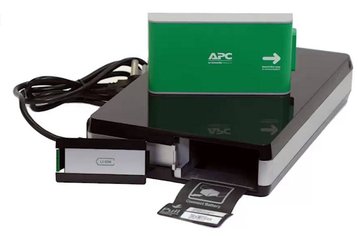Schneider Electric said it will soon be enhancing its range of uninterruptible power supplies (UPSs) with a series that feature lithium-ion (Li-ion) batteries. The new products will be suitable for use in three-phase power back-up applications.
A clue for one of the reasons for this move can be gleaned from the name of the current standard valve regulated sealed lead-acid (VRLA) batteries. Lead-based batteries are heavy and the use of Li-ion offers a considerable weight advantage.
When it comes to saving space, the new batteries will be able to pack a bigger punch into a smaller space because of the higher energy output of Li-ion technology. Amp for Amp, VRLA batteries of equal power are typically three times(or more) larger than Li-ion equivalents. The batteries also produce less heat.
Another advantage is the lower maintenance requirements. The new range should last longer and require replacement less often.
Great power, great responsibility
“While VRLAs remain the dominant UPS energy storage technology due to their low cost and high reliability, lithium-ion is becoming a more attractive option for a growing set of customers,” said Pedro Robredo, vice president of secure power systems at Schneider Electric.
“While the initial cost remains higher than comparable VRLA, the price gap has reduced significantly in the last few years. Based on the application, Li-ion solutions can offer a projected total cost of ownership savings from 10 percent to 40 percent over their design life.”
The downside are local, national and international regulations that govern the use and transportation of equipment containing Li-ion batteries. The amount of energy contained within lithium batteries is high, because they are designed to provide high levels of power. A malfunctioning lithium battery could generate a great amount of heat if short-circuited. In addition, the chemical contents of these batteries may catch fire if damaged or if improperly designed.
Schneider Electric thinks it has provided sufficient safeguards to ensure the integrity of the batteries which are available now for selected projects supporting Symmetra MW, Galaxy 7000 and Galaxy VM battery ranges. Broad availability will follow in the second half of 2016. Additional products for other three-phase product lines have been scheduled for 2017.

